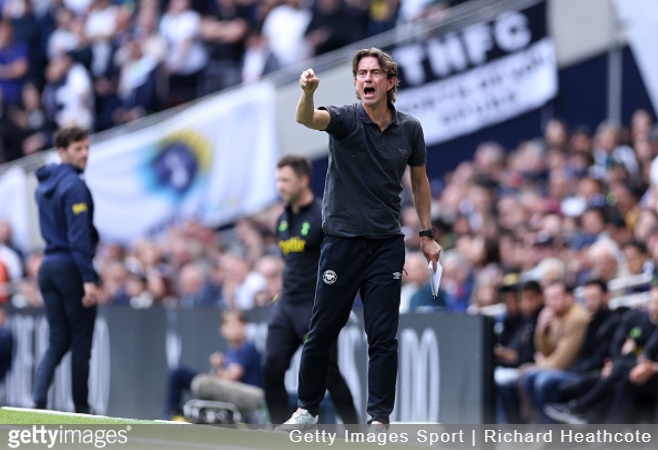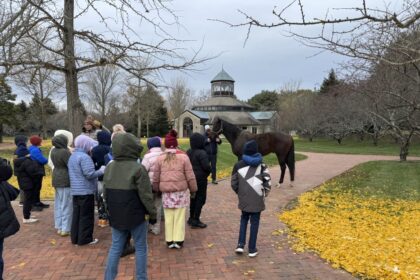Thomas Frank’s tenure at Tottenham Hotspur begins with a blend of warmth and caution. The Danish coach, sporting the club’s colors, radiated a sense of comfort and humor as he humorously noted the “honeymoon” phase before him. Following a tumultuous season where Spurs celebrated a Europa League victory but finished a disappointing 17th in the Premier League, Frank steps into a role defined by the need for a cohesive identity and stability. He is acutely aware of the significant challenge that lies ahead.
As the club’s fifth manager, he expressed his playful side by joking that it adds “a bit more risk” to his life. “Everything I do,” he explained, “is focused on the long-term, not just surviving one game or one season.”
His appointment comes on the heels of Ange Postecoglou, who provided fans with a rare glimpse of success by winning their first European trophy in over 40 years. However, that triumph coincided with a season marked by sharp declines domestically. Frank finds himself at a pivotal moment: part experienced, part revitalized, and undoubtedly in a phase of rebuilding.
Squad Structure and Injury Management
Central to Frank’s strategy is a focus on physical endurance. Last season’s injury woes compelled him to implement a system he refers to as “robustness building,” emphasizing careful management of player workloads, smarter rotations, and targeted training aimed at enhancing player fitness without overexertion. He made it clear that having players available is crucial for success.
Regarding recruitment, Frank highlighted the necessity for greater squad depth. To compete on multiple fronts, depth is as important as talent. While he avoided discussing specific transfer targets, his message was unambiguous: Tottenham must be better prepared to withstand the rigors of challenging campaigns. Fortunately, progress is underway, with Frank praising the acquisition of Mohammed Kudus as timely and potentially transformative. “He brings unpredictability, quality on the ball, and attacking dynamism,” Frank remarked, labeling him “almost perfect.”
Leadership Challenges and Key Players
One of Frank’s initial tasks will involve determining the futures of key players Heung Min Son and Cristian Romero, two pivotal figures for the team. While he has yet to make a definitive choice regarding the permanent captaincy, he maintained a diplomatic stance when asked about potential departures, keeping discussions open with players, club executives, and ultimately Daniel Levy.
Regarding Romero, Frank was straightforward: “He’s here and highly committed.” Both key players will likely play crucial roles in Frank’s plans, but their longevity at the club may depend on both personal aspirations and the club’s trajectory.
Coaching Philosophy and Practicality
Frank’s soccer philosophy aligns with Tottenham’s traditional focus on offensive flair but incorporates a pragmatic perspective. He expressed a desire to implement “brave, attacking football,” while underscoreing the importance of a strong defensive structure. His vision includes a mix of boldness and the wisdom of knowing when to attack and when to defend.
A significant area for improvement will be the effectiveness of set pieces, which has been a weakness in recent years. By referencing successful teams like Manchester City and Arsenal, he aims to marry attractive football with effective execution, a hallmark of elite teams. Frank aspires for Spurs to achieve this distinction.
Managerial Dynamics and Cultural Fit
Much attention will center on the relationship between Frank and chairman Daniel Levy. He expressed optimism about working alongside Levy, CEO Vinai Venkatesham, and technical director Johan Lange. Known for his emotional intelligence and interpersonal skills, Frank anticipates fruitful collaboration. His positive remarks about the club’s early transfer activity, particularly the signing of Kudus, indicate a promising start.
Perhaps Frank’s most significant asset is his credibility. He acknowledges that he doesn’t have all the answers, yet he demonstrates a clear understanding of the challenges ahead and projects confidence backed by past successes. At Brentford, he exceeded expectations with limited resources and helped build one of the Premier League’s most respected setups. Now, he faces the task of transforming Spurs into a cohesive unit that exceeds the sum of its parts.
Looking Ahead to the 2025/26 Season
So, what should fans anticipate under this new regime? First and foremost, patience, as there are no quick fixes. While Frank doesn’t promise miracles, he does emphasize a long-term project focused on conditioning, cohesion, and character. Although Tottenham might not start the season as title contenders—Frank shrewdly avoided making predictions—he believes that aiming for the top is paramount.
With new signings, tactical shifts, and a refreshed mindset, Spurs could become one of the more unpredictable and formidable teams in the Premier League. While aspirations for European football remain realistic, supporters will be eager to see the club develop a strong identity.
In his inaugural press conference, Frank offered no grand promises or bold proclamations. Instead, it was a thoughtful, honest presentation of quiet ambition—reflective of his character. Whether this approach will suffice in the volatile realm of Premier League management is yet to be seen, but it is clear that Spurs have a coach ready to envision, plan, and execute.
Embedded from Getty Images
Fan Take: This development is significant for soccer fans as it could herald a new era for Tottenham, potentially reigniting their competitive spirit. A successful Frank could not only redefine Spurs’ identity but also elevate the club within the Premier League, making them a formidable presence once again.



